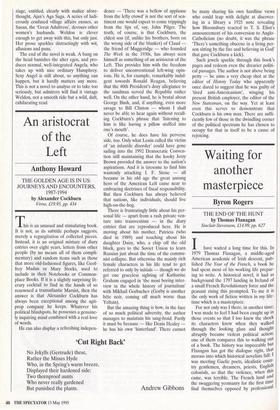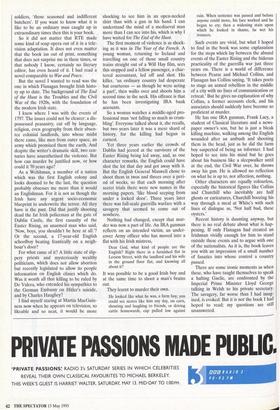Waiting for another masterpiece
Byron Rogers
THE END OF THE HUNT by Thomas Flanagan Sinclair-Stevenson, £14.99, pp. 627 Ihave waited a long time for this. In 1979 Thomas Flanagan, a middle-aged American academic of Irish descent, pub- lished The Year of the French, a book he had spent most of his working life prepar- ing to write. A historical novel, it had as background the 1797 landing in Ireland of a small French Revolutionary force and the peasant rising this prompted. To me it is the only work of fiction written in my life- time which is a masterpiece.
For not only was I there, in another time I was made to feel I had been caught up in those events so that I too knew the shock its characters knew when they walked through the looking glass and thought abruptly became violent political action; one of them compares this to walking out of a book. The history was impeccable but Flanagan has got the dialogue right, that morass into which historical novelists fall: I was meeting Gaelic poets, idealistic coun- try gentlemen, dreamers, priests, English colonials, so that the violence, when this came, was terrible. The French land and the swaggering yeomanry for the first time find themselves opposed by professional soldiers, 'those seasoned and indifferent butchers'. If you want to know what it is like to be an ordinary man caught up in extraordinary times then this is your book.
So it did not matter that RTE made some kind of soap opera out of it in a tele- vision adaptation. It does not even matter that the book isn out of print, something that does not surprise me in these times, or that nobody I know, certainly no literary editor, has even heard of it. I had read a novel comparable to War and Peace.
But the novel I wanted to read was the one in which Flanagan brought Irish histo- ry up to date. The background of The End of the Hunt is the Troubles and the Civil War of the 1920s, with the foundation of the modern Irish state.
I knew where I was with the events of 1797. The issues could not be clearer: a dis- possessed peasantry, cut off by language, religion, even geography from their absen- tee colonial landlords, into whose midst there came, like men from outer space, an army which promised them the earth. And despite the writer's dramatic skill, two cen- turies have anaesthetised the violence. But how can murder be justified now, or how could it 70 years ago?
As a Welshman, a member of a nation which was the first English colony and looks doomed to be the last, the question probably obsesses me more than it would an Englishman. For it is not as though the Irish have any urgent socio-economic blueprint to underwrite the terror. All they have is the past. Did that justify shooting dead the fat Irish policeman at the gate of Dublin Castle, the first casualty of the Easter Rising, an unarmed man who said, `Now, boys, you shouldn't be here at all.'? Or the second, a 17-year-old English schoolboy beating frantically on a neigh- bour's door?
For what came of it? A little state of slip- pery priests and mysteriously wealthy politicians, which does not allow abortion but recently legislated to allow its people information on English clinics which do. Was it worth all that killing to be ruled by De Valera, who extended his sympathies to the German Embassy on Hitler's suicide, and by Charles Haughey?
I find myself staring at Martin MacGuin- ness now when he appears on television, so likeable and so neat, it would be more shocking to see him in an open-necked shirt than with a gun in his hand. I can understand the mind of a mediaeval man more than I can see into his, which is why I have waited for The End of the Hunt.
The first moment of violence is as shock- ing as it was in The Year of the French. A young woman, returning to Ireland and travelling on one of those small country trains straight out of a Will Hay film, sees this stopped and a fellow passenger, a char- tered accountant, led off and shot. His killer, 'an ordinary country lad desperate but courteous — as though he were acting a part', then walks over and shoots him a second time in the neck. His offence is that he has been investigating IRA bank accounts.
So a woman watches a middle-aged pro- fessional man 'not falling so much as crum- bling'. Everyone talked about it, she recalls, but two years later it was a mere shard of history, for the killing had begun in earnest.
Yet three years earlier the crowds of Dublin had jeered at the survivors of the Easter Rising being led away, and, as one character remarks, the English could have shot the lot that day and got away with it. But the English General Maxwell chose to shoot them in twos and threes over a peri- od of weeks, so that each morning after secret trials there were new names in the morning papers, 'like blood seeping from under a locked door'. Three years later there was full-scale guerrilla warfare with a savagery that seemed to come out of nowhere.
Nothing had changed, except that mur- der was now a part of life. An IRA gunman reflects on an intended victim, an under- cover Army officer who has moved into a flat with his Irish mistress,
Dear God, what kind of people are the English? Right there in a furnished flat in Leeson Street, with the landlord and his wife in the ground floor flat, and knowing all about it?
It was possible to be a good Irish boy and at the same time to shoot a man's brains out.
They learnt to murder their own.
He looked like what he was, a farm boy; you could see scores like him any day, on carts, shouting and laughing to friends, or driving cattle homewards, cap pulled low against
rain. When sentence was passed and before anyone could move, his face worked and he began to cry; then a widening stain upon which he looked in shame, he wet his trousers.
Such events are vivid, but what I hoped to find in the book was some explanation for the steps which lay between the absurd events of the Easter Rising and the hideous practicality of the guerrilla war just three years on. There is a world of difference between Pearse and Michael Collins, and Flanagan has Collins saying, 'It takes poets to stage an armed rebellion in the middle of a city with no lines of communication or retreat.' But he gives no explanation of why Collins, a former accounts clerk, and his associates should suddenly have become so proficient at murder.
He has one IRA gunman, Frank Lacy, a student of Classical literature and a news- paper owner's son, but he is just a bleak killing machine, walking among the English wounded after an ambush and shooting them in the head, just as he did the farm boy suspected of being an informer. I had hoped to see into his mind but he goes about his business like a sleepwalker until at the end, the Civil War over, he throws away his gun. He is allowed no reflection on what he is up to, nor affection, nothing.
Other characters are equally colourless, especially the historical figures like Collins and Churchill who inevitably are half ghosts or caricatures, Churchill boozing his way through a meal at White's with such lines of dialogue as, 'Not half bad, these oysters.'
Recent history is daunting anyway, but there is no real debate about what is hap- pening. If only Flanagan had created an Irishman vividly enough for him to stand outside these events and to argue with one of the nationalists. As it is, the book leaves you with an impression of a small number of fanatics into whose control a country passed.
There are some ironic moments as when these, who have taught themselves to speak a halting Gaelic, are confronted by the Imperial Prime Minister Lloyd George talking in Welsh to his private secretary. The savagery, far worse than I had imag- ined, is evoked. But it is not the book I had hoped to read; my questions are still unanswered.



































































 Previous page
Previous page